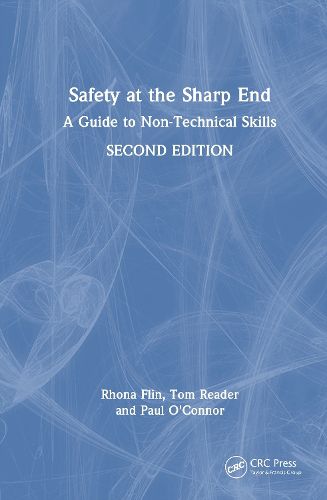Readings Newsletter
Become a Readings Member to make your shopping experience even easier.
Sign in or sign up for free!
You’re not far away from qualifying for FREE standard shipping within Australia
You’ve qualified for FREE standard shipping within Australia
The cart is loading…






Many 21st-century operations are characterized by teams of workers dealing with significant risks and complex technology, in competitive, commercially driven environments. Informed managers have realized the necessity of understanding the human dimension of their operations if they hope to improve production and safety performance. A key aspect is the non-technical skills of the system operators based at the 'sharp end' of the organization. These include the cognitive and social skills required for safe and efficient performance, often termed 'Crew Resource Management (CRM) skills'.
This book is a general guide to the theory and practice of non-technical skills (NTS) for safety. Now fully updated in this new edition, Safety at the Sharp End: A Guide to Non-Technical Skills considers the growth of interest in Crew Resource Management (CRM) approaches to identifying, training and assessing CRM/NTS skills. It covers the identification, training and evaluation of NTS and has been written for use by individuals who are studying or training these skills in CRM and other safety or human factors courses. It outlines the underlying principles, as well as practical techniques and advice and has been revised to cover the latest developments by drawing on a wider sample of work settings where an NTS approach is being adopted. A full literature review is offered, and the authors have drawn upon an international network of contacts across industry, military and healthcare occupations and academic sources to deliver current practice and emerging issues. The reader will develop a thorough understanding of the theory and practice of non-technical skills for safety from this title.
This book is an ideal read for professionals and those practising or studying human factors or industrial safety programmes. Its appeal will extend to those in safety-critical industries including healthcare, aviation, rail, maritime, energy production and the military.
This book:
$9.00 standard shipping within Australia
FREE standard shipping within Australia for orders over $100.00
Express & International shipping calculated at checkout
Stock availability can be subject to change without notice. We recommend calling the shop or contacting our online team to check availability of low stock items. Please see our Shopping Online page for more details.
Many 21st-century operations are characterized by teams of workers dealing with significant risks and complex technology, in competitive, commercially driven environments. Informed managers have realized the necessity of understanding the human dimension of their operations if they hope to improve production and safety performance. A key aspect is the non-technical skills of the system operators based at the 'sharp end' of the organization. These include the cognitive and social skills required for safe and efficient performance, often termed 'Crew Resource Management (CRM) skills'.
This book is a general guide to the theory and practice of non-technical skills (NTS) for safety. Now fully updated in this new edition, Safety at the Sharp End: A Guide to Non-Technical Skills considers the growth of interest in Crew Resource Management (CRM) approaches to identifying, training and assessing CRM/NTS skills. It covers the identification, training and evaluation of NTS and has been written for use by individuals who are studying or training these skills in CRM and other safety or human factors courses. It outlines the underlying principles, as well as practical techniques and advice and has been revised to cover the latest developments by drawing on a wider sample of work settings where an NTS approach is being adopted. A full literature review is offered, and the authors have drawn upon an international network of contacts across industry, military and healthcare occupations and academic sources to deliver current practice and emerging issues. The reader will develop a thorough understanding of the theory and practice of non-technical skills for safety from this title.
This book is an ideal read for professionals and those practising or studying human factors or industrial safety programmes. Its appeal will extend to those in safety-critical industries including healthcare, aviation, rail, maritime, energy production and the military.
This book: